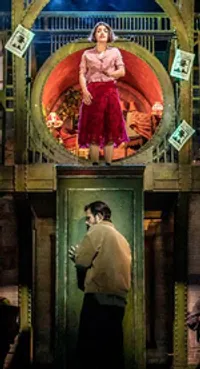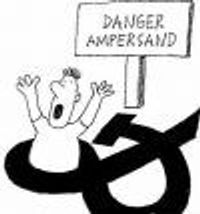RAGTIME is a good, flawed show **Spoilers**
#100re: RAGTIME is a good, flawed show **Spoilers**
Posted: 11/5/09 at 9:59pm
""There were gazebos and there were no Negroes."
Sorry. Rhyme-schmyme, MB.
That's a brilliant lyric! And dead-on.
If your concern is pedantic rhyming, then okay ...
blocked: logan2, Diamonds3, Hamilton22
#101re: RAGTIME is a good, flawed show **Spoilers**
Posted: 11/5/09 at 10:04pmSorry, Best 12 - We will simply have to disagree. Its a horrid lyric. RAGTIME is full of clunkers. Nice music though.
#102re: RAGTIME is a good, flawed show **Spoilers**
Posted: 11/5/09 at 10:05pm
We agree on that completely!
![]()
EDIT: And in defense of the lyric (which I know won't sway you, regardless) this paints the absolute perfect picture of life back then for "the white folks."
Gorgeous gazebos in their photo-ready locations ... but NO black people around at all. That's the way they perceived it. Even though the blacks were waiting on them hand and foot, while they were observing those gazebos and bandstands on a summer's day.
Brilliant. Brilliant Brilliant.
Best of all, I love the abruptness of the lyric. I remember being shocked by it, when they said it, just as ALL the Negroes flooded the stage to prove the contrary.
blocked: logan2, Diamonds3, Hamilton22
lynnetoomey
Understudy Joined: 5/8/09
#103re: RAGTIME is a good, flawed show **Spoilers**
Posted: 11/5/09 at 11:36pm
Michael Bennett and Best12:
For the record, "There were gazebos, and there were no negroes" is an exact quote from Doctorow's novel.
After Eight
Broadway Legend Joined: 6/5/09
#104re: RAGTIME is a good, flawed show **Spoilers**
Posted: 11/5/09 at 11:42pmTo Oldschool: Thanks for being succinct. I'll try to be equally so. I much prefer Andrew Lloyd Webber.
#105re: RAGTIME is a good, flawed show **Spoilers**
Posted: 11/6/09 at 12:19amYes, and I doubt he ever intended them to rhyme as a couplet in a musical phrase...
#106re: RAGTIME is a good, flawed show **Spoilers**
Posted: 11/6/09 at 12:20am
"RAGTIME is full of clunkers. Nice music though."
Ahh someone else agrees with me about the lyrics? I can't help but cringe at some of the rhymes, yikes. But the lovely music makes up for it. Love the music.
lynnetoomey
Understudy Joined: 5/8/09
#107re: RAGTIME is a good, flawed show **Spoilers**
Posted: 11/6/09 at 12:26amYou have this on good authority, Mike B??
#108re: RAGTIME is a good, flawed show **Spoilers**
Posted: 11/6/09 at 12:33amI'm assuming so, since he wasn't hired to write the lyrics for the musical. And even if its in the book - even if its meant to be the opening of an aria, it wouldn't change the fact that, that is a bad lyric.
#109re: RAGTIME is a good, flawed show **Spoilers**
Posted: 11/6/09 at 5:35am
"This notion of some people being successful just out of "luck" really rubs me the wrong way. I don't buy it for a minute. Tateh and Best12bars grandfather and many other successful people had some luck, sure, but luck is when opportunity meets preparation. and determination and creativity and perseverence. I think it is those latter qualities that distinguish the Tatehs of the world from all the others, not just luck. Is it possible some really talented people never "make" it only because they did not get their lucky break? Sure, I suppose. But to think that those who do make it are "just lucky?" That sounds like jealousy and sour grapes-- and the same warped sense of entitlement to the American Dream espoused by Willy Loman and Sondheim's Assassins."
This is an interesting discussion. I think we're coming down on opposite sides because of two valid points - you don't think that a show should attack the American Dream just for the sake of it, or at the expense of acknowledging real achievement. I don't think a show should embrace a successful American Dream story at the expense of following through on the social justice issues that the story has raised.
As I said, I agree that it was perseverence etc combined with luck that led to Tateh's success. I concede that he may have been more perservering and creative than those around him too, for that matter. The way in which his business idea is handed to him - the guy even tells him that the product needs a name! - counts against this, but obviously that could just reflect the inevitable difficulties of getting plot points across quickly and clearly. IMO, while we can know that Tateh is lucky, it's impossible to decide whether or not he's *particularly* creative/hardworking given the limited information we have (from the musical at least).
I think that what distinguishes the unsuccessful people around Tateh in 'Ragtime' from some of those in the other dramas you mentioned is that they don't start off with average American lives (ie, pretty good lives) that they are unsatisfied with. Instead, they're working hard just for a chance get the life of the average American. But in the meantime they are suffering from poverty, sickness, unfair working conditions, etc. Surely it shouldn't only be the lucky - or even the unusually creative or brilliant - who have the right to a reasonable quality of life? Yet most of them miss out. I think that we *should* be sour about this. Ragtime seems to start making a point about this, then abandons it for a (superficially) feelgood story instead.
#110re: RAGTIME is a good, flawed show **Spoilers**
Posted: 11/6/09 at 2:54pm
This thread has become fascinating.
Thank you (particularly to best12bars) for sharing and articulating why Ragtime is such a brilliant work.
And, yes, I agree about
"There were gazebos and there were no Negroes."
It doesn't matter to me whether it's a lyric, prose or poetry. Its contrast and its "abruptness" had the effect to shock and thus make its point superbly. And this isn't the only occasion when Ragtime shoots from the hip.
#111re: RAGTIME is a good, flawed show **Spoilers**
Posted: 11/7/09 at 5:54am
"Because it heaps sentiment and emotional import upon these events, but the resonance never really comes because we're given no reason to really be invested or care other than we're being told to."
I saw it tonight for the first time after being a long time fan of the cast recording and I have to say that this pin points one of the major issues I had with it. I think if they cut some of the characters (Nesbitt, Houdini,) Some of the Songs (Gettin' Ready Rag, Crime of the Century, Atlantic City, Henry Ford and as much as I enjoy it the baseball song) and added in some more songs and material for the central characters they've decided to focus on it would help a bunch. Though the songs above are enjoyable they don't do a whole bunch to advance the plot and could be easily worked around.
#112re: RAGTIME is a good, flawed show **Spoilers**
Posted: 11/7/09 at 10:55am
I can agree about the superfluousness of some of the songs, I don't think Gettin' Ready Rag is one of them. That song is an important part of conveying the excitement about Coalhouse's relationship with Sarah. They have so little time to develop any one of the strands that a song like that is crucial in development of the characters' relationship.
That said, I don't think the excursions to hear about Henry Ford, Evelyn Nesbit, baseball, or Atlantic City interfere with our ability to care about the story and the characters. But again as best12bars has pointed out that is because the characters are not necessarily individual people, they represent some aspect of America. The care I felt came from realizing that they acccurately represented pieces of the American mosaic.
Updated On: 11/7/09 at 10:55 AM
TheEnchantedHunter
Broadway Legend Joined: 6/27/05
#113re: RAGTIME is a good, flawed show **Spoilers**
Posted: 11/7/09 at 11:54am
Please. Gettin Ready Rag doesn't tell us a thing about Coalhouse and is in fact a shuck-and-jive number that is not a little condescending. So much for 'shooting from the hip.'
#114re: RAGTIME is a good, flawed show **Spoilers**
Posted: 11/7/09 at 11:35pm
Gettin' Ready Rag shows us how excited Coalhouse is about finding Sarah again. That is what a song is supposed to do, accomplish something dialog can't. The song is boisterous, upbeat, an explosion of energy, anticipation, and excitement that anyone in love might feel after finding a lost love. The style is not condescending, it is character appropriate. After that song there can be no doubt about the strength of his feelings for Sarah. Since we get almost nothing to see from their actual relationship, a song along these lines is not superfluous. You can criticize whether the song works, but it is not in the same category as the other songs listed that are far less relevant to the characters and the story development.
I don't get the "shooting from the hip" comment.
#115re: RAGTIME is a good, flawed show **Spoilers**
Posted: 11/8/09 at 10:51pm
Can't we all just agree that Jonathan Hammond works those Houdini costumes like nobody's business. GRRRRRR!!!!! Hot stuff! ![]()
#116re: RAGTIME is a good, flawed show **Spoilers**
Posted: 11/9/09 at 12:11amWhen I saw the show on Friday evening, in the opening number *SPOILER* Houdini didn't fly in upside-down like I'd heard. The cast all looked up, did their "oohs" and "ahhs" . . and the background music played, while they all just sort of looked up. Finally, The Little Boy stepped forward (on his cue, I suppose) and said "Warn the Duke!" . . . I thought it was funny. Especially the "ooh" and "ahh" we got, while seeing nothing any everyone standing still.
#117re: RAGTIME is a good, flawed show **Spoilers**
Posted: 11/9/09 at 12:21amoh wow Budfrump, sorry to hear that. It was pretty cool.
#118re: RAGTIME is a good, flawed show **Spoilers**
Posted: 11/9/09 at 8:29amEither there was a problem the night Houdini did not show up, or they have altered the show...because he flies in upside down when I saw it.
speedjeans
Chorus Member Joined: 7/18/07
#119re: RAGTIME is a good, flawed show **Spoilers**
Posted: 11/11/09 at 10:13pm
Best12, if the history of film, literature, music, and theater has taught us nothing else it's that there are rarely works insulated from the most harsh, generally subjective, and not infrequently, passive-aggressive assaults of the critic.
Oliver Sacks, the prolific neurologist in the current issue of "Brain" has a fascinating piece on music. One observation stands out:
"The emotional response to music can be unbelievably complex and mysterious and deep. You can be sort of agonized, sort of ecstatic, and you don't know what's happening. You can't even say what the feeling is."
It's not a reach to suggest the same mysterious neurological "ghost in the machine"
will elicit opposite or discordant responses in various people when listening to poetry or observing narrative.
The bottom line is, criticism because of advances in the neurosciences has been seen for what it is: nothing more than the expression of idiosyncratic, articulated responses to various forms of stimuli, none any more valid than another.
Videos










